You are collateral damage in the patent wars

The patent is mostly a good thing, right? It is a way to show recognition for all the work an individual puts into developing something completely new. It’s useful in determining who creates and who copies. The system may have its kinks, but it’s a good one overall. We revolve around it each day whether we know it or not.
A patent is an easy way to make money, but these days not so much for inventing things but inventing concepts to patent. To make money from them, usually someone has to get sued. The process involves a considerable amount of money, starting with paying lawyers, paying court costs, paying for transport, hotels, meals, and so on. All these things add up and they account for every cent as to what a trial would and does cost.
I declare independence from Apple

Since December 1998, when on impulse I bought the original iMac from CompUSA, I've used Apple gear. No longer. Late yesterday, I replaced the last fruit-logo with another, fulfilling my pledge nearly a month ago to boycott Apple. I wanted to declare independence sooner, but with so much news to write about in June and Google I/O last week, researching and replacing the AirPort base station was too much trouble. But it's offline now -- and, along with Apple TV, going on Craigslist today.
Circumstances since choosing to boycott make me all the more adamant. Last week, US District Judge Lucy Koh issued two preliminary injunctions against Samsung devices -- Galaxy Tab 10.1 and Galaxy Nexus. Yesterday she denied Samsung's request to stay the ban pending appeal. Anticipating Nexus' similar fate, Google swiftly responded by pulling the phone from its online store and dispatching an update to existing phones. I chose to boycott being so angry by Apple's aggressive patent bullying that thwarts competition and takes away consumer choice. Today, I celebrate America's independence anniversary by gaining freedom from Apple.
Google sends wrong update to Galaxy Nexus
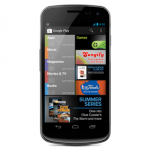
Let me see if I understand this. Google, the company that perfected web search and through it changed the lives of billions of people, must disable the local functonality from its flagship smartphone -- all because of Apple? Now do you see why about a month ago I boycotted Apple and last week called the preliminary injunction against Galaxy Nexus shameful?
Watch out. This is one Android update you don't want to accept. I asked my wife this morning: "Do you use local search on your phone?" She has Galaxy Nexus. My lovely looked up with a startled WTF looked and answered: "Yeah". Of course she uses local search on her phone. Who doesn't? You. If you own Galaxy Nexus and accept the update. It's the wrong one for Google to send out. The search giant should dispatch Android 4.1, which if, I understand correctly, changes search so that Apple's bully patent doesn't apply. C`mon, Google, you can do better.
Apple doesn't want you to know my film, 'Steve Jobs -- The Lost Interview', is on iTunes
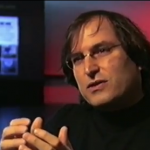
My little film about Steve Jobs has finally made it to iTunes (YouTube as well!) as a $3.99 rental, but you wouldn’t know it. Deeming the film “too controversial,” Apple has it on the site but they aren’t promoting it and won’t. The topic is “too sensitive” you see. It isn’t even listed in the iTunes new releases. You have to search for it. But it’s there.
Maybe I’m not even supposed to tell you.
Apple's injunction stopping Galaxy Nexus sales is shameful

I'm ashamed of Apple, and myself for giving anything to iPhone today. To celebrate iPhone's fifth anniversary, I asked BetaNews writers to offer missives based on their experience using the handset. We published Wayne Williams' story on Wednesday, another by Chris Wright early day and my own this afternoon. Two other stories are in the queue. We'll run them over the weekend, however, instead of today. There's no longer any sense of birthday celebration in these halls.
Today, US District Judge Lucy Koh gave Apple a great gift for iPhone's fifth, that I see as anything but. Apple's preliminary injunction against the Samsung-manufactured, Google-branded Galaxy Nexus is an outrage and demonstrates how far fallen is Steve Jobs' company from the innovative spirit that brought iPhone to market. The original set the smartphone market ablaze and brought Apple to unimagined success as seen from 2007. There was a time when Apple innovated rather than litigated and up-ended so-called copycats by making bold, breath-taking successor products. But that Apple is gone, buried with Jobs, who sadly left this world last year.
Preliminary injunction bars Galaxy Nexus, but Apple is a loser for winning
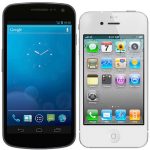
Apple's ridiculous patent assault against Samsung finally hits Google, which suddenly looks genius for choosing Asus to manufacture the Nexus 7 tablet. On Friday, US District Judge Lucy Koh issued a preliminary injunction against Galaxy Nexus, which is Google's flagship, stock Android smartphone. Days earlier she barred Galaxy Tab 10.1. For the preliminary injunction to go into effect, Apple must first put up $96 million.
What timing. To preview Android 4.1 Jellybean, the company gave one to each of more than 5,000 developers during Google I/O earlier this week. The new OS releases to Motorola XOOM tablets and Galaxy Nexus in mid-July, making the smartphone the first to get the important upgrade. The preliminary injunction would somewhat stymie Jellybean distribution ahead of iO6, which Apple is months from releasing. New features include voice response, that in BetaNews testing smoke Apple's Siri. If you're thinking about buying Galaxy Nexus, don't wait!
The iPhone moment
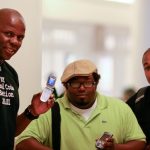
Third in a series. Editor's note: To commemorate iPhone's fifth-anniversary, we present several stories looking at its debut and colorful history -- so far.
iPhone is five years old today, and what a half-decade it has been. Apple launched the handset on June 29, 2007, marking its first foray into the cellular device market and with a single carrier: AT&T, which was Cingular before the launch. There were risks all around: Apple leapt into a market of sharks -- Nokia and Research in Motion, namely; AT&T bet the brand on the one device; and iPhone sold, locked and unsubsidized for $499 and $599 -- who would pay unlocked-mobile prices for a device that wasn't? One million people through early September 2007. For these early buyers, and perhaps for bazillion more who followed, iPhone isn't a phone but a cultural phenomenon.
It's a gargantuan war among industry titans and the winners will control everything for years to come

Damn, what an extraordinary month.
Let’s recap. First, we saw a spate of exciting new Ultrabook announcements, along with some x86- and ARM-based Windows 8 tablets at Computex. Then Apple introduced new spins of iOS and OS X for tablets and PCs, respectively, at its developer gathering. Microsoft unveiled Windows Phone 8 at the Windows Phone Summit -- and let's not forget the Surface tablet. And this week, Google rolled out new products and concepts buckshot-style at Google I/O, showcasing its first branded tablet, the Nexus 7, and Android 4.1, just to name a few.
What you need to know about security software

What does security software even mean now? It’s such a vast concept that it can cover everything from file scanning to parental controls and everything in between. It pretty much covers everything except someone telling us, "Don’t do that, you’re going to regret it!"
It is the most quickly evolving type of software that we run on our computers, but it hardly gets noticed.
Apple admits malware defeat

Apple is one of the single software companies that hasn't really faced the problem of viruses, for years claiming their operating system is the most secure among all. Seemingly every Mac user claims that his or her computer is the safest and greatest -- they’re invincible!
But those claims collapse as Apple products grow in popularity. Back in April 2012, Flashback infected 670,000 Macs worldwide. The Mac maker responded so well it needed to do the job twice, as the first security patch wasn’t so good. In light of all this one has to wonder whether Apple needs to call it quits and just admit defeat.
RIM is a far more formidable player than either Google or Apple
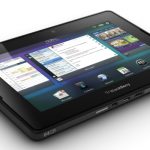
I like it when I’m right. Whether it’s dispelling the myths surrounding the Windows 7 kernel (I was right), or bursting the bubble of the VDI-everywhere zealots (right again), I enjoy having my predictions come true.
I’m also an operating system technology purist. I believe that a strong OS foundation is what determines whether or not a given platform will succeed over the long haul. This is why I’m convinced that Microsoft will ultimately dominate the enterprise mobile computing space (Windows Phone 8 is based on Windows NT, an OS for which I have tremendous respect). And it’s also why I believe they eventually will share this space not with Apple or Google, but rather the company that everyone likes to write-off: Research in Motion.
Android users are smarter than you

Just ahead of Google I/O 2012, The Street claims that "Android users don't know enough to matter". Interesting story, especially considering the timing, and one that’s bound to stir lots of criticism just because it puts down all Android fans in the world.
There are plenty of references, but they sustain a flawed point of view.
Apple's patent case against Motorola is over

One thing I have to say about US District Judge Richard Posner, he doesn't mince words. He's direct and cutting. If only there were more jurists like him on the bench. Cut he did today, in an order slicing Apple and Motorola to bits -- but the fruit-logo company he turned to mush. In a 38-page opinion and order, the judge effectively ended Apple's patent lawsuit against Motorola. Apple can appeal, but it's finished presenting before Posner.
"It would be ridiculous to dismiss a suit for failure to prove damages and allow the plaintiff to refile the suit so that he could have a second chance to prove damages", he writes. "This case is therefore dismissed with prejudice; a separate order to that effect is being entered today". Ouch.
Would you believe Android tablet adoption is even with iPad?
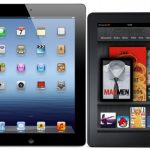
I surely don't. Perhaps even I am too influenced by all the pro-Apple propaganda. But the figures come from a reasonably reliable source, Online Publishers Association, which puts US iPad adoption at 52 percent and Android at 51 percent. Okay, I'll pause so you can wipe off coffee, or whatever else just spit out, from your computer screen.
The numbers don't add up to 100 percent, because some people own more than one type of tablet. Android gains largely come from Kindle Fire, which share is 32 percent -- four times new iPad and one point more than the original. Year over year, overall Android penetration rose from 32 percent, while iPad's fell from 72 percent. Perhaps it's no coincidence Android rose by 19 points and iPad fell by 20.
Microsoft Word 2012 appears in iOS App Store, but you don't want to buy it
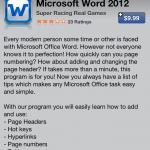
Not unless you'd like to waste $9.99 and feel the fool for it.
That's because Microsoft isn't the developer, but Super Racing Real Games. Well, there's nothing real about this app and the only "super racing" is to get your money before the app disappears, because it can't be long on the App Store. Surely Microsoft will issue a take-down notice -- if for no other reason. But Microsoft Word 2012's appearance in the App Store makes me wonder about Apple's so-called rigorous approval process. The company rejects legit apps but lets this through?
© 1998-2025 BetaNews, Inc. All Rights Reserved. Privacy Policy - Cookie Policy.